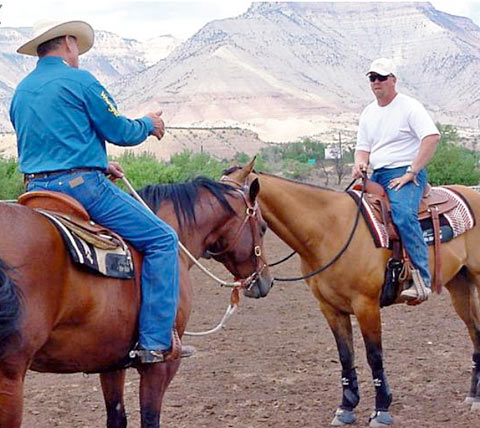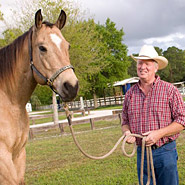 |
|
Looking for a Horse Trainer?
By John Lyons for The Josh and John Lyons Horse Trainer Certification Program
Many horse owners at some time or another seek out a trainer to work with their horse.
With today’s sources, magazines to Internet, finding a trainer may be quite easy. Knowing what to look
for in a trainer may be a different matter, therefore, I would like to give you a few suggestions to consider
as you search. I can think of three common reasons (but not limited to three) for sending a horse to a
trainer – starting to train the unbroke horse, fixing a problem(s), and refining the performance of a horse.
No matter what the reason or regardless of the training that you seek out for your horse, the most
important aspect of the entire experience is your responsibility to learn what it is that your trainer has
taught your horse and your ability to follow through with what has been taught. Otherwise, no matter how
good the trainer is, you may undo his excellent work due to your lack of knowledge and/or lack of skills
that are specific to his training method. Don’t misunderstand - you do not have to be perfect or have the exact skills as your trainer, otherwise you would have done the work yourself.
What I am saying is that you need to commit yourself to learning and to do the best you can to learn the
cues that your horse will know when leaving the trainer. The horse will allow you to have trial and error.
He is adaptable. At the same time he will know if you are really off the mark. One important concept
that you must understand is that after your horse leaves a trainer you take over his/her role as the trainer.
Every time you come in contact with your horse, you are teaching him/her something. The horse is a
learning machine and is expecting to be taught all the time. An example of this can be as simple as when
you lead the horse. If you allow the horse to dive for grass when you are trying to lead him from the barn
to the arena, he learns that is it okay to do so. If you allow the horse to take 20 steps before he comes to
a complete halt, when you really wanted him to stop much sooner than that, then he learns that it is okay
to do so. Although, these are simple examples, the concept applies in all that you do with your horse.
Let’s look at the horse as your car and you as the mechanic. If your car is not running you need to know
how to fix it to keep it running. You also need to do general maintenance on the car as well (oil changes,
tire rotation, etc). You really need to know how to keep it running and how to maintain the engine and its
parts. If you compare this to the horse, it is the same as you training the horse as well as knowing how to
care for the horse. You want your horse to do the things you want (trail ride, show, etc) as well as to
have the proper care in order to do these things. Often what can happen though is that you spend the
majority of your time caring for your horse, but don’t know how to fix “engine problems” when there is a
training problem. You find yourself in a situation where you are changing the oil and rotating the tires but
the engine doesn’t run. When this happens, you may make the decision to involve another mechanic, a
trainer, to fix the problem. When you do so you must learn the method of training used by this trainer.
Otherwise, you may find yourself out on a trail far away from home and if a problem surfaces, you may
have a long ride back. My point is, then, know what cues will make your horse be responsive to you.
In many cases it is our fault if the horse is not doing what we ask - not the horse’s fault and not the
trainer’s fault. Many trainers get blamed when an owner is not being successful with his/her horse.
Unfortunately, there are times when this is true, but the owner must take a realistic look at the time and
effort that he/she has invested with learning what the trainer has taught the horse and make evaluations from this perspective.
Now I would like to share some suggestions when looking for a trainer.
 |
1) Look for references from past customers. A trainer should have no problem with you wanting references about his past work.
2) Ask about the trainer’s experience and education. A good trainer doesn’t have to have formal
education in the sense that he/she has participated in course work, but does have to have a well thought
out plan when training your horse. Think of all there is to know about horses. We can never learn it all. Your trainer should have that attitude as well.
There are trainers that will find time in their busy schedules to attend clinics, symposiums, expos or
maybe purchase educational materials. Don’t hesitate to find out what a trainer has done to expand
his/her knowledge. These professional trainers each have very successful horse training businesses.
They take time in their busy schedules to learn more about horse training. Here they are
involved in an advanced training seminar with John.
3) A trainer should have a contract. Read the contract carefully. Ask all the “what if’s” that may happen and get answers that you understand. Everything should be in writing.
4) Look for a trainer that invites you in to watch what he/she does with other horses and then extends the invitation when working with your horse.
5) A good trainer will have a detailed plan, not only for the horse but also for the owner. A good trainer
will require the owner to participate in the learning while the horse is being trained. When you are seeking
out a trainer, you should look for this. The problem that trainers experience is that some horse owners do
not want to learn this information. Some trainers will charge more for their services if the owner doesn’t
participate with their horse’s learning. Sound crazy? Not at all. A trainer that does this is sending a strong
message to the owner about the importance of their learning for his/her overall safety and success when handling the horse.
The life of a horse trainer can be a rewarding one. It can also be frustrating as well. What I have found,
though, is that the frustration does not come from working with the horse, but with the lack of
commitment that is seen with some of the clients/owners. It is easy to place blame on a trainer when
things do not go as planned. This is often seen when an owner gets hurt when working with the horse.
No one can ever guarantee you that you will not get hurt when working with your horse.
What you can be assured is that the more you commit to having your horse learn the proper cues that
he/she needs to know (either from a trainer or from you) and the time it takes for you and your horse to
learn these cues the more you can minimize the chances of having bad experiences with your horse. We
all know that bad news travels faster than good news. It’s human nature. A good trainer may be
incorrectly evaluated and not be at fault. The way owners describe their experience with their trainer can have a huge effect on that trainers repeat business.
Some people will buy a horse that is “bomb proof” or “dead broke”. This is wonderful but you still need
to know the horse’s cue system. Some well-trained horses, if not the majority are that way due to
consistent training and handling. On occasion you will find the well-trained horse that will forgive lots of
mistakes and “take care of” the owner. No doubt there are those horses out there. The reality of the
horse experience is that a person that doesn’t know how to stay consistent with what a horse has been
taught will quickly undo the training of the horse. If you are in a position to purchase a well-trained horse,
that is great! Unfortunately, most of the people that desire to own a horse cannot or choose not to afford
a horse with training of this level. When this happens, be prepared to spend time in your education.
Horse trainers and owners need to have a good understanding what is expected of each party. The horse
trainer’s responsibility is to do the job that the owner wants. It is the horse owner’s responsibility to learn
the cues and signals that the trainer will be teaching the horse. If your goal is to spend a lot of time with
your horse and cover ground, put your horse in a horse trailer and drive down the road. You will be a lot
safer and your horse will thank you. If your goal is to have a horse and a meaningful relationship,
including care, grooming and safe rides, then take the time to find out what makes the horse operate.
Contact: Andrea - Josh Lyons Events Coordinator
8606 Guthrie Court
Cross Plains, Tennessee 37049
Phone: 615-379-1056
Email: info@lyonslegacy.com
Website: joshlyons.com |
 |
|
To advertise your horse product or service, contact Ann
|
 |
|
InfoHorse.com, Horse Information Lives Here ® 2/23/2026
Contact Us to Advertise to over a million Horse Owners.
All images and content Copyright© 2012 by InfoHorse.com, Equusite.com.
Horse Owners are Dog Owners; Dog Product Information dognowner.com
|
|
|
Articles, Academic Schools, Arena Maintenance, Animal Communicators, Barns, Barn and Accessories, Barn Equipment and Tractors, Breast Collars, Grooming Products for Horses, Hay Feeders, Horse Blankets, Horse Books, Horse Videos, Horse Breeders, Horse Camping Gear, Career Schools, Carts and Buggies, Horse Training Clinicians, Equestrian Clothing, Dogs and Puppies, Horse Fencing, Western Art & Furniture, Horse Property for Sale, Horse Products For Sale, Fly Control, Foal Care, Horse Footings, Horse Gifts, Horse Health and Nutrition, Hoof and Leg, Horse Insurance, John Lyons Certified Trainers, Equine Lawyers, Leather Care, Links, Horse Property, Horse Photography, Portable Horse Stalls, Arenas and Roundpens, Horse Riding Schools, Horse Schools, Safety Products, Services for Horses, Horse Trailers, Horse Shipping, Horse Skin Coat Care, Horse Software, Specialty Trainers, Horse Summer Camps, Tack, Horse Trainers, Treats and Snacks, Truck Accessories, Trucks, Horse Vacations, Western Lifestyle, jewelry
|
|
|
 |
 |
 |
John and Josh Lyons Legacy Horse Trainer Certification
Josh Lyons has earned a place among the world's top horsemen by applying a simple philosophy: "Knowledge and motivation are the only tools that you need to bring with
you into your barn." As one of the world's best horse trainers and clinicians, Josh helps all levels of horse enthusiasts from trainers to trail riders to have a better relationship
with their horse. Josh's attitude towards horsemanship is based on "trust not trauma." His proven success in "solving anyone's horse problem" has made him a top
horseman and horse trainer. The core of Josh's program is a unique method of conditioned response horse training that modifies the horse enthusiast's attitude towards the horse by
providing in-depth understanding and knowledge.
More information...
|
|